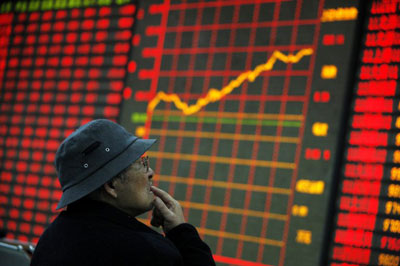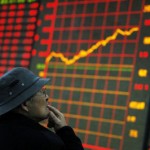China’s Stocks Head for Biggest Weekly Gain in Three Years

China’s benchmark stock index headed for its biggest weekly advance in three years on optimism a slide in oil prices will reduce costs for transport companies and the central bank may continue to loosen monetary policy.
China Everbright Bank Co. and Citic Bank Corp. both climbed 10 percent, adding to weekly gains of at least 20 percent. Air China Ltd. and China Cosco Holdings Co. jumped 10 percent after crude sank to a four-year low. China Oilfield Services Ltd. paced losses for oil-related producers. Citic Securities Co. slid 3.4 percent, paring this month’s rally to 28 percent.
The Shanghai Composite Index rose 1 percent to 2,656.56 at 1:22 p.m. The measure has advanced 6.8 percent this week, the most since October 2011, after the central bank unexpectedly lowered deposit and lending rates to support an economy that’s expected to grow this year at the slowest pace since 1990. The People’s Bank of China may soon cut reserve-requirement ratios, according to First Shanghai Securities.
“The PBOC already cut interest rates, and the market is expecting it will be extended to an RRR cut,” said Linus Yip, strategist at First Shanghai Securities. “The financial sector is in a good mood.”
Hong Kong’s Hang Seng China Enterprises Index (HSCEI) gained 1 percent, extending this week’s rally to 6 percent. The CSI 300 Index rose 0.8 percent. The Hang Seng Index added 0.2 percent.
The Shanghai index has advanced 9.6 percent this month, the most since December 2012. A cut in reserve ratios may come irrespective of the growth outlook or the lending requirement of the system, Aviate Global LLP said. Reserve ratios have remained unchanged at 20 percent for major banks and 18 percent for smaller banks since May 2012.
Keep Buying
“Keep buying China,” said Douglas Morton, head of Asia research at equity brokerage Aviate Global. “We are currently in a period of outperformance for Hong Kong and China markets. It is this time of year we generally get government policy supporting the economy to hit full-year targets and when next year’s growth targets are announced. We expect more supportive policy and an imminent RRR cut.”
A gauge of financial companies in the CSI 300 has surged 14 percent this week, the most for a five-day period since October 2010. New China Life Insurance Co. jumped 30 percent this week, while Founder Securities Co. rallied 33 percent. China Merchants Securities Co., which China International Capital Corp. expects will be added to the FTSE China A50 Index, added 21 percent.
Trading volumes in the Shanghai index were 84 percent above the 30-day average for this time of day, according to data compiled by Bloomberg. About 339 billion yuan ($55 billion) of shares changed hands in the Shanghai Stock exchange yesterday, the most since Bloomberg began compiling data in 2005.
Transport Shares
Oil prices plunged, with West Texas Intermediate oil down 6.7 percent from the Nov. 26 close. It was trading at $68.78 a barrel in Tokyo and headed for its worst week since May 2011. OPEC refrained from cutting output to ease a supply glut.
China Southern Airlines Co., the biggest domestic carrier, jumped 10 percent, while China Eastern Airlines Corp. advanced 10 percent. Cosco Shipping Co. added 4.7 percent. China Oilfield Services led declines for energy companies, sliding 3.1 percent.
China, the largest crude oil importer globally, will benefit as every one percent drop in oil prices means $2.2 billion in savings and a boost in total net profit by 0.2 percent, according to Citigroup Inc. Transport will be a key beneficiary as it consumes about 50 percent of total oil, while consumption and manufacturing industries will also gain, it said. Every 100 yuan drop in jet fuel prices can reduce annual costs for China’s three major airlines by about 400 million yuan, according to Citic Securities Co.
Topping Japan
“The fall in oil prices is good news for the whole economy and the market as we’ll see a significant drop in operating costs,” Dai Ming, a fund manager at Hengsheng Asset Management Co. in Shanghai, said by phone today. “Market sentiment is quite strong and the market isn’t likely to see a big correction.”
The Shanghai index has advanced 24 percent this year, heading for the biggest annual gain since 2009, on optimism a trading link with Hong Kong will lure investors back to the market. The measure plunged 35 percent from the start of 2010 through the end of last year.
China’s market capitalization climbed to $4.48 trillion yesterday after a 33 percent increase this year, according to data compiled by Bloomberg. Japan’s slipped to $4.46 trillion and has dropped 3.2 percent since the end of December. China was briefly the second-biggest market, behind the U.S., in March 2011 after an earthquake in Japan sent shares tumbling in Tokyo.
While the weakening yen played a role in Japan’s shrinking market value in dollar terms, the Shanghai Composite Index (SHCOMP) has climbed three times as much as Tokyo’s Topix this year. Economists predict authorities will take more steps to support an economy headed for its slowest annual expansion since 1990.
The Shanghai measure is valued at 9.7 times 12-month projected earnings, compared with the five-year average multiple of 10.6, according to data compiled by Bloomberg. Its 14-day relative strength measure, measuring how rapidly prices have advanced or dropped during a specified time period, was at 81.5 yesterday. Readings above 70 indicate a price may be poised to fall.
Source: Bloomberg – China’s Stocks Head for Biggest Weekly Gain in Three Years




























